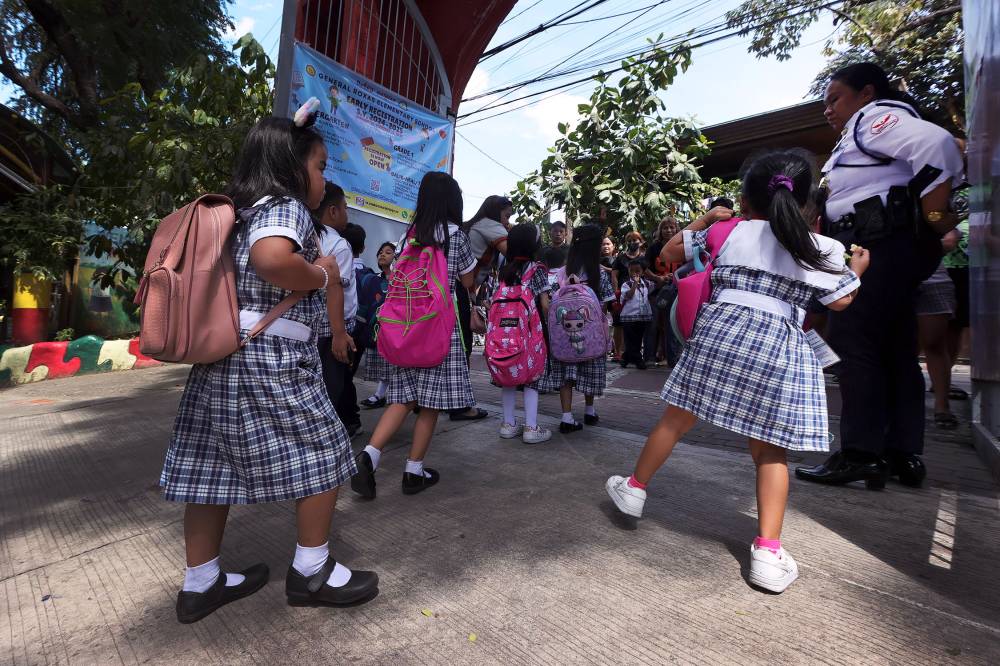
MIDDLE GROUND So learners’ well-being is not jeopardized, classes will open on July 29, 2024 and end on April 15, 2025, according to President Marcos. —Grig C. Montegrande
MANILA, Philippines — President Ferdinand Marcos Jr. has approved the gradual shift of the country’s school calendar to the old June-to-March schedule starting next school year, “in response to public concerns,” a decision widely praised by teachers and education stakeholders.
For the 2024-2025 academic year, classes will open on July 29, 2024, and end on April 15, 2025, doing away with Saturday in-person classes, according to a statement from the Presidential Communications Office (PCO).
Marcos had a meeting with Vice President and Education Secretary Sara Duterte on Tuesday, during which he made the decision to heed the clamor from teachers and students who had complained that the current calendar exposed them to extreme heat in the dry season, compounded by this year’s El Niño phase.
READ: DepEd all set for June school opening in ’25
“Let us just add to the number of school days without touching Saturdays, so school days will remain the same,” the President told Duterte during the meeting.
In a post on its Instagram account on Wednesday, the Office of the President said the decision to return to the old school year was made to “emphasize education quality and the well-being of learners and teachers.”
The policy will apply to public schools, but private schools may also choose to follow the new schedule.
READ: June opening possible with shorter school calendar, says teacher’s group
Duterte’s 2 options
The President stressed the need to maintain 182 school days without using Saturdays for classes as “a commitment to improving educational outcomes and stabilizing the academic schedule.”
The PCO said the incoming year’s schedule of classes “will start the gradual return of the school year to June of every year until the end of March the next year.”
During her meeting with the President, Duterte presented two proposals for the shift of the school year, both of which would end on March 31, 2025: 182 school days with 15 in-person Saturday classes or 167 school days with no in-person Saturday classes.
She said the Department of Education (DepEd) consulted teachers, school officials and parents about the proposed shift in the school calendar amid health issues arising from high heat indices.
But Marcos rejected both options and decided on a middle-ground approach.
According to the President, the 167-day calendar was “too short” and would “significantly reduce the number of school days and contact time and may compromise learning outcomes.”
Close to 180 days
On the other hand, the 182-day calendar might “jeopardize” students’ well-being and demand more resources, as it meant going to school on Saturdays, Marcos said.
As a compromise, he said the DepEd should adjust the school year to end on April 15, 2025, to allow students to complete 182 days without having to go to school on Saturdays.
Education Undersecretary Michael Poa, the DepEd spokesperson, said the original June-to-March cycle should resume after the end of the next school year on April 15, 2025, as that would mean the succeeding school year begins on June 16.
“We are still close to the prescribed 180 days by our curriculum specialists,” he told reporters in a chance interview.
The DepEd is set to release a department order regarding the new calendar for next school year, Poa said.
The Alliance of Concerned Teachers, one of the groups that campaigned for the return of the June school opening, described Marcos’ decision as “a fruit of public school teachers, students, and parents’ consistent clamor.”
The teachers’ group coalition noted that the new schedule came close to its own proposal.
“While there will be classes [in] the first two weeks of April, this is a guarantee that Saturday classes will no longer be necessary and it will be close to the traditional 180 days,” it said.
Synchronized
“This is a positive step toward addressing the concerns of our teachers, students and parents who have long been advocating for a more humane and conducive learning environment,” ACT Teachers Rep. France Castro said.
Classes traditionally ran from June to March, but the DepEd implemented a shift in the school calendar in October 2020 to synchronize with the recommended schedule of the Commission on Higher Education for colleges and universities, which would run from August to June, coinciding with the government’s fiscal year.
The DepEd, however, was forced to delay its class opening in 2020, from June to October, in the transition to blended learning at the height of the COVID-19 pandemic, which shuttered schools as part of community lockdowns.
But stakeholders began pushing for the return to the old schedule as students and teachers endured punishing heat in classrooms due to seasonal weather aggravated by El Niño. That has led to the suspension of classes in several areas of the country over the past weeks.
Since 2022, the school year has started in the month of August and ended in June or July.
In the current school year, which began on Aug. 22, 2023, the last day of classes would fall on June 14, this year.
That means students and teachers will have one month and 15 days of vacation before the start of the next school year. —with a report from Krixia Subingsubing